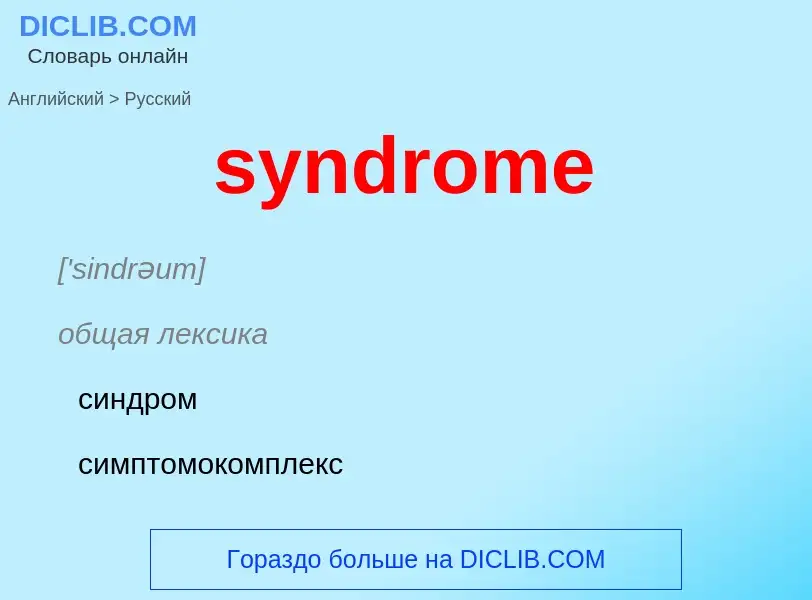Tradução e análise de palavras por inteligência artificial ChatGPT
Nesta página você pode obter uma análise detalhada de uma palavra ou frase, produzida usando a melhor tecnologia de inteligência artificial até o momento:
- como a palavra é usada
- frequência de uso
- é usado com mais frequência na fala oral ou escrita
- opções de tradução de palavras
- exemplos de uso (várias frases com tradução)
- etimologia
syndrome - tradução para russo
['sindrəum]
общая лексика
синдром
симптомокомплекс
нефтегазовая промышленность
синдром (неисправности)
существительное
общая лексика
цепь взаимосвязанных событий
сочетание явлений (общественной жизни и т. п.)
стечение обстоятельств
медицина
синдром
совокупность симптомов
синдром, совокупность симптомов
синоним
Definição
Wikipédia
A syndrome is a set of medical signs and symptoms which are correlated with each other and often associated with a particular disease or disorder. The word derives from the Greek σύνδρομον, meaning "concurrence".: 1818 When a syndrome is paired with a definite cause this becomes a disease. In some instances, a syndrome is so closely linked with a pathogenesis or cause that the words syndrome, disease, and disorder end up being used interchangeably for them. This substitution of terminology often confuses the reality and meaning of medical diagnoses. This is especially true of inherited syndromes. About one third of all phenotypes that are listed in OMIM are described as dysmorphic, which usually refers to the facial gestalt. For example, Down syndrome, Wolf–Hirschhorn syndrome, and Andersen–Tawil syndrome are disorders with known pathogeneses, so each is more than just a set of signs and symptoms, despite the syndrome nomenclature. In other instances, a syndrome is not specific to only one disease. For example, toxic shock syndrome can be caused by various toxins; another medical syndrome named as premoter syndrome can be caused by various brain lesions; and premenstrual syndrome is not a disease but simply a set of symptoms.
If an underlying genetic cause is suspected but not known, a condition may be referred to as a genetic association (often just "association" in context). By definition, an association indicates that the collection of signs and symptoms occurs in combination more frequently than would be likely by chance alone.: 167
Syndromes are often named after the physician or group of physicians that discovered them or initially described the full clinical picture. Such eponymous syndrome names are examples of medical eponyms. Recently, there has been a shift towards naming conditions descriptively (by symptoms or underlying cause) rather than eponymously, but the eponymous syndrome names often persist in common usage.
The defining of syndromes has sometimes been termed syndromology, but it is usually not a separate discipline from nosology and differential diagnosis generally, which inherently involve pattern recognition (both sentient and automated) and differentiation among overlapping sets of signs and symptoms. Teratology (dysmorphology) by its nature involves the defining of congenital syndromes that may include birth defects (pathoanatomy), dysmetabolism (pathophysiology), and neurodevelopmental disorders.

